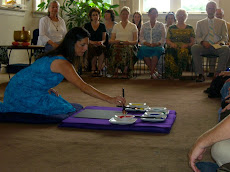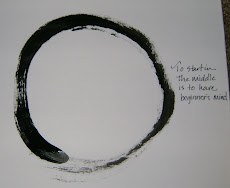Feeling the neurosis side of Buddha energy...that paralysis that comes from overwhelm. All the while I have that Karma neurosis going...as in, starting one thing and then dropping it for another...dropping it for the something that looks or seems "more important" or "better."
Right now books are very much part of my "shiny object" obsession. I recently purchased a book called Brain Rules (by John Medina), after attending a workshop at the NSTA (National Science Teachers Association conference). One of the things Medina discusses is that multi-tasking is a myth. Though we can walk and talk at the same time, to truly give our attention - our awareness - to more than one thing truly isn't possible (he cites the study of talking on a cell phone while driving as an example of us humans not truly being able to multi-task).
One of the pieces I was actually looking at in Brain Rules was a chapter that included the idea of repetition as a means of learning. Just prior to his chapter on repetition, however, Medina points out research that suggests that emotional experiences stay with us memory-wise longer than simply intellectual ones. That it is the gist - the bigger picture - rather than the details that we store in our long-term memory.
Medina cites John Bransford who edited How People Learn, and says, "[Experts'] knowledge is not simply a list of facts and formulas that are relevant to their domain; instead, their knowledge is organized around core concepts or 'big ideas' that guide their thinking about their domains" (Medina, 2008, p. 85).
So that got me thinking about the emotional aspect of ritual - the connecting aspect, especially as it relates to community creation and interconnectedness. Something I'd like to explore (as well as how repetition of the ritual plays a role in term sof deeper connection, deeper learning: prajna).
But of course, then, I want to explore five million other things at the same time. Shocked?
The thing is: as much as I feel the paralysis of overwhelm, and as much as I know that I easily distract because I want to explore so many things, what I really know is that this is part of my process. The paralysis will lift, I will become more able to hone in and focus on what I need to, when I need to, and like Bob Marley once sang, "every little thing will be all right."
Lizard Coloring Page
2 years ago





No comments:
Post a Comment